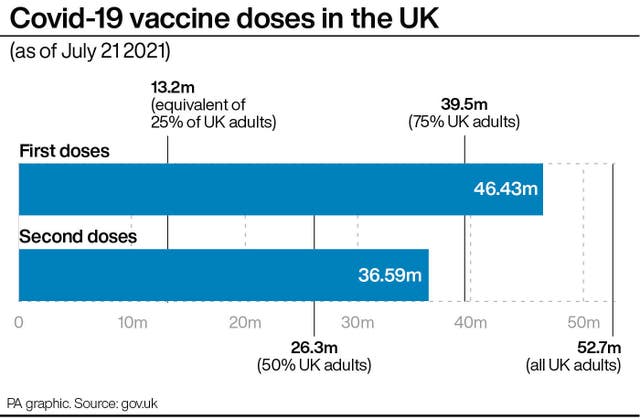
The Delta variant of coronavirus may be 46% more likely to cause reinfection than the Alpha variant first identified in Kent, new figures suggest.
Data from Public Health England (PHE) shows that, while the overall chances of getting reinfected are very low, the Delta variant, first identified in India and which accounts for around 99% of cases in the UK, poses a higher risk.
It came as new figures showed the breakdown of how many people in hospital with the Delta variant have had one or both doses of a Covid-19 vaccine.
From June 21 to July 19, some 1,788 people were admitted to hospital after testing positive for Delta.
Of these, 970 (54%) were unvaccinated, while 530 (30%) had received both doses.
We have published weekly cases numbers for all #COVID19 #variants in the UKhttps://t.co/NxiBAaLVss
Please come forward for both doses of the COVID-19 #vaccine as soon as you are eligible. pic.twitter.com/G4n2N7ZoMU
— Public Health England (@PHE_uk) July 23, 2021
In total, 3,692 people have so far been admitted to hospital with the Delta variant, of whom 2,152 (58%) were unvaccinated and 843 (23%) were fully vaccinated.
From February to mid-July, among the under-50s who had received both vaccines just four patients died with the Delta variant out of 15,346 cases in this group (0.02%).
READ MORE: Covid Scotland — Six further deaths and 1,505 new cases
There have been 34 deaths among the unvaccinated in the same age group, among 119,063 Delta cases (0.02%).
Meanwhile, among the over-50s who have received both vaccinations there have been 220 deaths out of 13,427 cases (1.64%).
And there have been 131 deaths among the unvaccinated over-50s among 2,337 cases (5.6%).
On the topic of reinfections, PHE experts looked at the PCR test results for a group of people who had already had a positive Covid test at least 90 days earlier.
There were 83,197 people who tested positive in the 11-week period of the analysis, of whom 980 (1.2%) had possible reinfections.
Overall, the team found that the chance of reinfection with the Delta variant was 46% higher compared to the Alpha variant.
PHE said that further work is now being undertaken to examine the risk of reinfection.
 (PA Graphics)
(PA Graphics)
The PHE briefing also noted that the Delta variant, which has spread globally, currently accounts for around 99% of cases across the UK.
The Beta variant, first identified in South Africa, currently accounts for less than 0.2% of cases in the UK.
READ MORE: Some critical workers to be exempted from self-isolation rules in Scotland
Dr Jenny Harries, chief executive of the UK Health Security Agency, said: “This most recent hospitalisation data shows once again just how crucial vaccination is in protecting us from severe illness and death.
“Two doses of vaccine are far more effective against Covid-19 than a single dose, so please make sure that you come forward to get your second dose as soon as you are invited.
“As we emerge from restrictions and vaccine coverage continues to rise, it is important to remember that, while the protection provided by vaccination is excellent, it is not total.
“It is still as important as ever that we continue to exercise caution.
“Remember that meeting outside is safer than inside, get two doses of the vaccine as soon as you can, isolate if you are told to by NHS Test and Trace, and if you show symptoms stay home and get a PCR test.
“Covid-19 has not gone away and we must all continue to play our part.”



Why are you making commenting on The Herald only available to subscribers?
It should have been a safe space for informed debate, somewhere for readers to discuss issues around the biggest stories of the day, but all too often the below the line comments on most websites have become bogged down by off-topic discussions and abuse.
heraldscotland.com is tackling this problem by allowing only subscribers to comment.
We are doing this to improve the experience for our loyal readers and we believe it will reduce the ability of trolls and troublemakers, who occasionally find their way onto our site, to abuse our journalists and readers. We also hope it will help the comments section fulfil its promise as a part of Scotland's conversation with itself.
We are lucky at The Herald. We are read by an informed, educated readership who can add their knowledge and insights to our stories.
That is invaluable.
We are making the subscriber-only change to support our valued readers, who tell us they don't want the site cluttered up with irrelevant comments, untruths and abuse.
In the past, the journalist’s job was to collect and distribute information to the audience. Technology means that readers can shape a discussion. We look forward to hearing from you on heraldscotland.com
Comments & Moderation
Readers’ comments: You are personally liable for the content of any comments you upload to this website, so please act responsibly. We do not pre-moderate or monitor readers’ comments appearing on our websites, but we do post-moderate in response to complaints we receive or otherwise when a potential problem comes to our attention. You can make a complaint by using the ‘report this post’ link . We may then apply our discretion under the user terms to amend or delete comments.
Post moderation is undertaken full-time 9am-6pm on weekdays, and on a part-time basis outwith those hours.
Read the rules hereLast Updated:
Report this comment Cancel